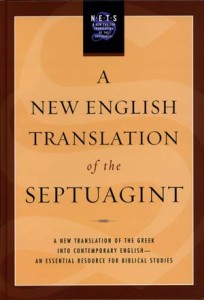The following is an interview with Peter Gentry, Professor of Old Testament Interpretation at The Southern Baptist Theological Seminary.
Dr. Gentry wrote a very helpful essay on the Septuagint for the ESV Study Bible.
He is currently editing Ecclesiastes and Proverbs for the Göttingen Septuagint Series and is giving leadership to the Hexapla Institute.
What is meant by the “Septuagint”?
In a strict or technical sense, made before the middle of the Third Century B.C. Within another hundred and fifty years, all the books of the Hebrew Bible had been translated into Greek and in a loose and non-technical sense, the term Septuagint is used for all of the Greek translation(s) of the Jewish Scriptures (what Christians call the Old Testament).
Similar to the history of the King James Version of the Bible, which was revised regularly from the time of translation in 1611 into the late Nineteenth Century, the original translation in Greek was being revised fifty or a hundred years later. Precise determination of what is the first translation as opposed to later revision is not clear in every book. Accurate editions of this text are in the process of preparation by the Septuagint Institute in Göttingen, Germany. All of these factors contribute to uncertainties as to exactly what we mean by the Septuagint.
When was the Pentateuch first translated into Greek, and when were the Prophets and Writings translated?
Most scholars agree that the Pentateuch was translated in Egypt during the Third Century b.c., possibly around 280, according to the testimony of the early church fathers. The books in the Prophets and Writings sections of the Hebrew Canon were translated later, most of them by 130 b.c. Systematic, thoroughgoing revisions were made from possibly 200 b.c.–a.d. 200.
Do we know what motivated Jews to translate the Hebrew Bible into Greek?
A number of theories have been proposed, including the following: Hellenistic Jews required Greek scriptures (1) for their religious life and worship; (2) for the education of their children; (3) as a legal document; or (4) as cultural heritage for the Alexandrian royal library. Others think that a new authoritative edition of Homer (c. 150 b.c.), which used textual criticism to establish its text, became a model and incentive for the Alexandrian Jews to have their own authoritative text of the Hebrew Scriptures.
Is it true that there were 72 translators?
No. This number comes from a piece of propaganda called The Letter of Aristeas (c. 150–100 b.c.), which purported to explain the origin of the Greek translation of the Pentateuch in light of criticisms at the time. The name Septuagint comes from the Latin word for 70, i.e., septuaginta. The Septuagint is commonly abbreviated LXX, the Roman numeral for 70.
How many translators of the Greek Pentateuch were there then?
Probably just five, one for each book, according to the rabbinic traditions (Aboth of Rabbi Nathan 37; Sôferîm i.7).
Should it bother evangelicals who believe in the inerrancy of Scripture that the NT writers sometimes quote the LXX where it differs from the Masoretic text?
The NT writers sometimes took the Septuagint wording and applied it to a new circumstance (e.g., Acts 14:11 borrowed words from Ps. 118:22; 2 Cor. 6:18a borrowed words from 2 Sam. 7:14 and other texts). At other times the NT writers corrected the Septuagint reading in order to bring it into greater conformity to the Hebrew texts (e.g., see the use of Isa. 28:11–12 in 1 Cor. 14:21, or the use of Isa. 63:10 in Eph. 4:30). The use of the Septuagint doesn’t imply that the NT writers thought that the original Hebrew was mistaken; rather, it means that they affirmed the truthfulness of that which they were quoting or adapting in their own writing.
Why is it important to study the Septuagint?
Several reasons make study of the Septuagint important: (1) It provides extremely early textual testimony to the Hebrew Scriptures; (2) it provides us with an extremely early understanding of Hebrew grammar and word meanings otherwise unknown to us; (3) it essentially provides for us the earliest commentary on the Hebrew text (since all translation involves interpretation); (4) it serves as a key witness to the thought and worldview of Second Temple Judaism (c. 450 b.c.–a.d.70), since it was produced in the intertestamental period; (5) it is the key to understanding the Greek of the NT, since it was used so often by the apostles and by the early church; (6) it can shed light on translation debates today.
 What are some of the projects currently underway in Septuagint studies that may be of interest?
What are some of the projects currently underway in Septuagint studies that may be of interest?
NETS is a new translation of the Greek Jewish Scriptures, entitled A New English Translation of the Septuagint and the Other Greek Translations Traditionally Included Under that Title (and abbreviated as NETS), which is also available for free online. An accompanying commentary series is also planned.
For those who want to learn more about the Septuagint, is there a good introductory text that you would recommend?
Yes: An Invitation to the Septuagint, by Karen Jobes and Moises Silva.

